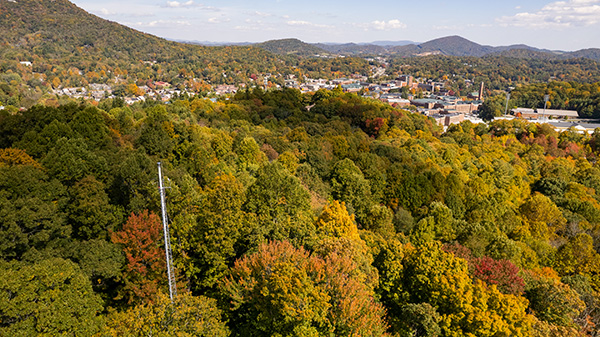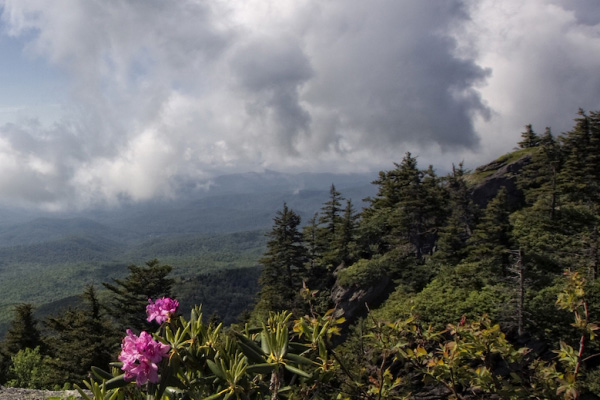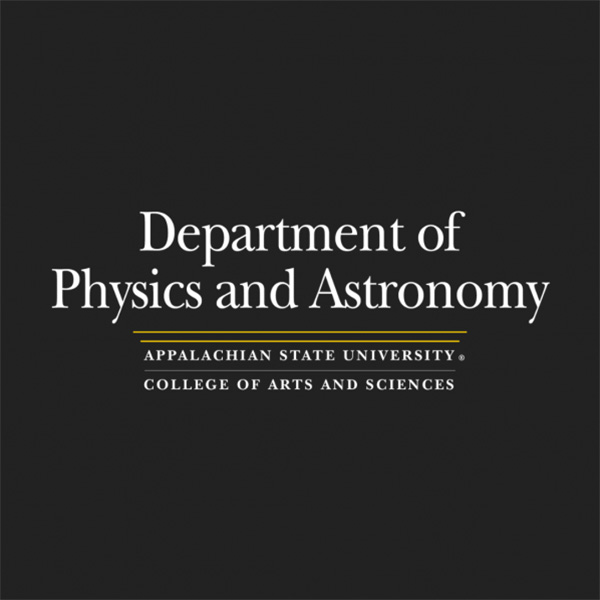Dr. Robert Swarthout, associate professor in the Department of Chemistry and Fermentation Sciences and Department of Geological and Environmental Sciences at App State, left, is the principal investigator on a three-year, $531,902 grant from the National Science Foundation. The grant supports AppalAIR’s study of aerosols and their effects on the Earth’s climate. AppalAIR’s scientific tower, pictured in the foreground at right, rises above the tree line overlooking App State’s Boone campus. Photos by Marie Freeman, Wes Craig and Chase Reynolds
BOONE, N.C. — This fall, the National Science Foundation has awarded three faculty at Appalachian State University a three-year, $531,902 grant to support aerosol research at App State’s Appalachian Atmospheric Interdisciplinary Research (AppalAIR) facility and Applied Fluids Laboratory.
The interdisciplinary project — which began in September and will continue through August 2026 — is funded by NSF’s Major Research Instrumentation Program and supports the development of an Aerosol Chemical Speciation System (ACSS) at AppalAIR.
Dr. Robert Swarthout, associate professor in the Department of Chemistry and Fermentation Sciences and Department of Geological and Environmental Sciences, is the principal investigator on the project. Department of Physics and Astronomy professors Dr. Chris Thaxton and Dr. James Sherman serve as co-investigators.
“Having an Aerosol Chemical Speciation Monitor at the AppalAIR site will improve the world-class data set that we already produce,” said Swarthout. “It will allow us to figure out how the chemicals that make up aerosols are changing as our country changes the way we use our land and generate energy. Knowing more about changes in aerosol chemistry, along with the other measurements of aerosol size and interactions with sunlight, will help us understand how aerosols are impacting our health and climate.”
Currently, the team also includes contributions from four App State physics students: Ethan Barber ’22, an engineering physics graduate student from Durham; Shawn Beekman ’22, an engineering physics graduate student from Cary; Mason Fuller, a junior physics major from Colfax; and Tess Mickey, a junior physics major from New London. Additional undergraduate and graduate students will have the opportunity to contribute to the ACSS-enabled projects.
“As professors, we are also passionate about training the next generation of atmospheric scientists,” Swarthout said. “The ACSS will provide opportunities for App State students to train in atmospheric science using state-of-the-art instrumentation and make them more competitive for high-quality careers in this growing field.”
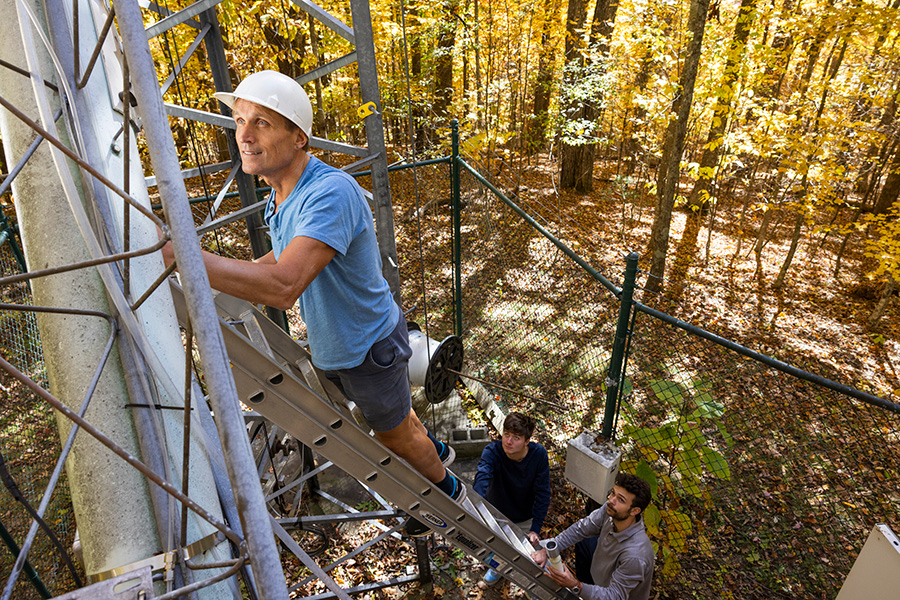
Dr. James Sherman, professor in App State’s Department of Physics and Astronomy, checks cables and connections on the Appalachian Atmospheric Interdisciplinary Research (AppalAIR) tower while Ethan Barber ’22, an engineering physics graduate student from Durham, center, and Shawn Beekman ’22, an engineering physics graduate student from Cary, far right, hold the ladder below. Sherman, Barber and Beekman are part of the research team that received a three-year, $531,902 grant from the National Science Foundation to study aerosols’ effects on the climate. Photo by Chase Reynolds
Aerosols represent uncertainty in climate change understanding
AppalAIR began in 2009 to better understand changing regional meteorology and air quality and their impacts on climate change and ecosystem health. The AppalAIR facilities at App State are part of National Oceanic and Atmospheric Administration (NOAA) and NASA monitoring site networks located across the country.
Fluid mechanics is the application of the laws of force and motion to fluids (liquids and gases). App State’s Applied Fluids Lab works to seek a better understanding of the relationship between local meteorology and observed aerosol loads, as well as the influence of the meteorological conditions through which aerosols are transported on their way from their source regions to the Southern Appalachians.
Atmospheric aerosols — observed as haze, smoke and dust — modify Earth’s energy balance directly by scattering and absorbing incident sunlight and indirectly by serving as seeds for cloud droplets. Aerosols’ direct and indirect effects on radiation are the largest uncertainties in climate forcing, which is a change in the planetary energy balance due to various factors, according to the latest Intergovernmental Panel on Climate Change Assessment Report in 2021.

Dr. Chris Thaxton, professor in the Department of Physics and Astronomy, is one of three App State professors taking part in a three-year study to examine the effects of aerosols on Earth’s climate. The project is supported by a $531,902 grant from the National Science Foundation. Photo by Chase Reynolds
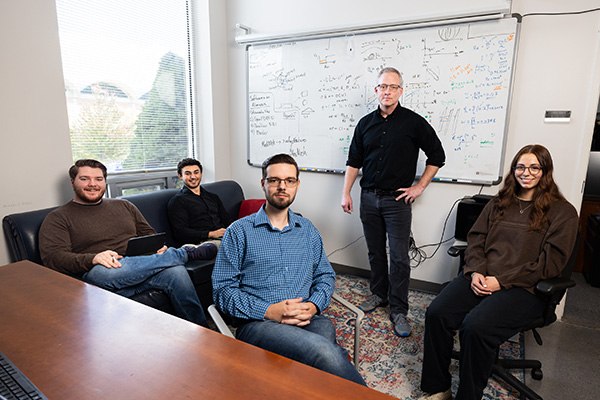
Dr. Chris Thaxton, professor in the Department of Physics and Astronomy, second from right, leads a supportive team in App State’s Applied Fluids Lab that will assist with research on the effects of atmospheric aerosols on Earth’s climate. The three-year project is supported by a $531,902 grant from the National Science Foundation. Pictured with Thaxton, from left to right, are Aiden Keaveney ’23, an engineering physics graduate student from Durham; Nick Mencis ’23, an engineering physics graduate student from Bakersville; Joshua McNeill ’23, an engineering physics graduate student from Fleetwood; and Tess Mickey, a junior physics major from New London. Photo by Chase Reynolds
In addition to their impacts on climate, aerosols are criteria air pollutants — air pollutants for which acceptable levels of exposure can be determined and for which an ambient air quality standard has been set. These pollutants are regulated by the Environmental Protection Agency because of their potential effects on respiratory health.
In 2024, the ACSS will be used in two large, collaborative NSF-funded field campaigns between App State, Georgia Tech and NOAA to study aerosol water uptake and aerosol–cloud interactions. Additionally, the ACSS will enable App State to compare measurements from AppalAIR to those at the NSF-funded Addressing Systems Challenges through Engineering Teams (ASCENT) network of sites across the United States, which study aerosol chemistry, size distributions and sources.
“Ultimately, we will contribute to a growing body of data across the country and similar sites around the world to better predict the future human health and environmental effects of aerosols,” Swarthout said.
Aerosol data from AppalAIR have been used in several global studies, including the Intergovernmental Panel on Climate Change Assessment Report. The ACSS collects detailed aerosol chemical composition measurements that will be used to better understand how pollution from various aerosol sources and smoke from wildfires are modifying the chemical composition of aerosols. These chemical measurements, along with measurements of aerosol size, their ability to accumulate water vapor and their ability to modify cloud properties, will be used to assess the link between chemical composition and climate and human health impacts.
What do you think?
Share your feedback on this story.
About the A.R. Smith Department of Chemistry and Fermentation Sciences
The A.R. Smith Department of Chemistry and Fermentation Sciences offers a Bachelor of Arts in chemistry, a Bachelor of Science in chemistry with eight different concentrations and an interdisciplinary Bachelor of Science degree in fermentation sciences. The department’s programs prepare students to attend graduate and professional schools, as well as for employment in the pharmaceutical and fermentation industries and other business sectors. Learn more at https://dcfs.appstate.edu.
About the Department of Geological and Environmental Sciences
Located in Western North Carolina, Appalachian State University provides the perfect setting to study geological and environmental sciences. The Department of Geological and Environmental Sciences provides students with a solid foundation on which to prepare for graduate school or build successful careers as scientists, consultants and secondary education teachers. The department offers six degree options in geology and two degree options in environmental science. Learn more at https://earth.appstate.edu.
About the Department of Physics and Astronomy
The Department of Physics and Astronomy’s curriculum has an applied nature that includes a core of fundamental physics courses and laboratory experiences. The department prepares graduates for a variety of scientific, teaching or engineering professions, as well as future educational endeavors. Learn more at https://physics.appstate.edu.
About the College of Arts and Sciences
The College of Arts and Sciences (CAS) at Appalachian State University is home to 17 academic departments, two centers and one residential college. These units span the humanities and the social, mathematical and natural sciences. CAS aims to develop a distinctive identity built upon our university's strengths, traditions and locations. The college’s values lie not only in service to the university and local community, but through inspiring, training, educating and sustaining the development of its students as global citizens. More than 6,800 student majors are enrolled in the college. As the college is also largely responsible for implementing App State’s general education curriculum, it is heavily involved in the education of all students at the university, including those pursuing majors in other colleges. Learn more at https://cas.appstate.edu.
About Appalachian State University
As a premier public institution, Appalachian State University prepares students to lead purposeful lives. App State is one of 17 campuses in the University of North Carolina System, with a national reputation for innovative teaching and opening access to a high-quality, cost-effective education. The university enrolls more than 21,000 students, has a low student-to-faculty ratio and offers more than 150 undergraduate and 80 graduate majors at its Boone and Hickory campuses and through App State Online. Learn more at https://www.appstate.edu.

